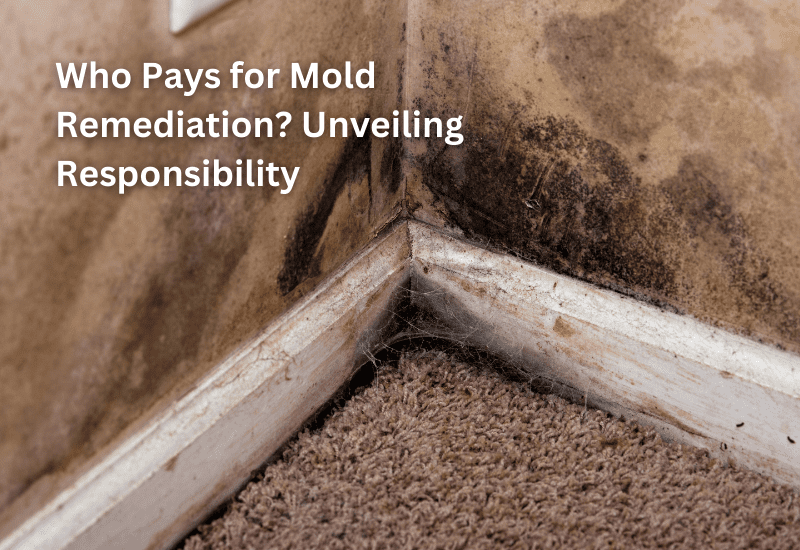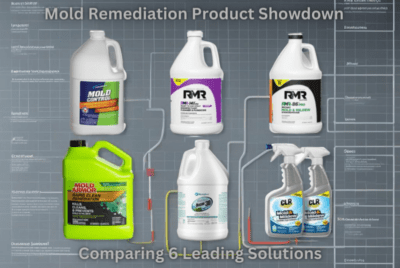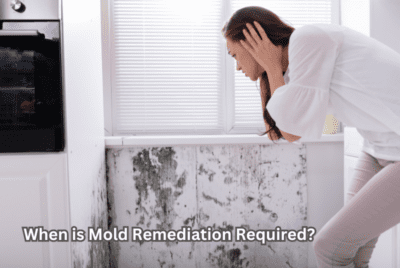Who Pays for Mold Remediation? Unveiling Responsibility
Comprehending Responsibility for the Abatement of Fungus
Mold is a problem that cannot be overlooked in any way once it invades a property. The question of who should pay for its removal often arises. This is not just a question but has far-reaching implications for homeowners, tenants, landlords and potential property buyers alike.
Responsibilities of Homeowners
Who pays for mold remediation? This is a common question among people because the process can be quite costly. Additionally, knowing who should foot the bill is important when dealing with rental or purchase agreements.
As a general rule, usually whoever caused the mold damage will have to pay for its abatement. It may be either through action or inaction i.e., negligence but different situations come with different twists on this rule.
For example, normally speaking homeowners are responsible for clearing any molds that grow within their premises; if they emanate from sources such as unattended leaks; poor ventilation systems or lack of regular checks by concerned parties like landlords and other agents involved.
Liability In Rental Properties
Let us now shift our attention to rental properties where things tend to get more complicated than before. So, whose duty is it supposed to be when there’s an outbreak of mildew at someone’s rented house?
Well, most times blame falls squarely upon shoulders belonging to landlords because after all they’re mandated by law (and common sense) to provide habitable dwellings free from hazardous substances including mold spores which cause allergic reactions among other health risks associated with this fungi type.
However, there are exceptions too; if tenant’s lifestyle habits lead them into creating conditions favorable for growth, then he/she becomes liable even though landlord still remains ultimately accountable since part of his/her duties involve making sure that building remains safe throughout its occupancy period irrespective of who lives inside at any given time hence everything boils down individual cases really…
Purchasing Property with Mold
Suppose you want to buy a house but then realize that there is mold infestation within its walls? So, what do you do next? Who pays for remediation in this case?
Normally it should be the current owner’s responsibility because technically speaking you haven’t acquired ownership rights yet. Nonetheless there’s always a catch! Mould problem can become one of those things which are up for negotiation during home buying process – sounds interesting, right?
You could either ask them to reduce price so as cater for future removal costs or demand them to clean up first before completing transaction but being aware about existence of fungi and who has obligation towards getting rid off it becomes very important during these discussions.
Preventing Moisture: Intrusion and Other Strategies
Proactive Property Maintenance
Knowing who pays for mold removal is good but preventing recurrence saves time and money. Remember that fungus cleanup can be quite expensive hence the need to keep it away in the first place, agree?
The most effective preventive measure against mildew is frequent property maintenance. Always be on the lookout for any signs like leaking pipes; poor ventilation systems or even general dirtiness which may encourage growths of different types including black molds known to cause serious health problems such as stachybotrys chartarum etc.
Tenant Role In Preventing Mold Growth
Every occupant should strive at maintaining healthy living conditions within their rented space as failure to do so might attract high charges during next inspection exercise aimed at detecting presence of molds. Would you like me to repeat that renters?
Obligations Of the Landlord
Another thing landlords can contribute towards prevention efforts is conducting regular checks on all areas surrounding houses under their care since they’re more likely than not going come across some risks relating to moisture intrusion leading into development mildews among others hazardous substances thus endangering lives residents besides damaging structural integrity buildings themselves too plus attracting lawsuits from such tenants.
Insurance Policies and Choosing a Remediation Service Provider
Understanding Insurance Coverage for Mold Damage Restoration
What if it happens that mold situation becomes uncontrollable? Suppose costs involved are beyond reach? Well, here’s some good news – there’re certain insurance covers which cater for this specific problem… does that bring relief?
However, these policies often have a catch. They only cover mold damage if it is a ‘covered peril’. Confused? Let me explain.
In insurance language, a ‘covered peril’ is just an event that causes damage such as fire or flood. If mold grows from them, then insurance company may pay for its removal.
On the other hand, if mold results from neglect or could have been prevented like slow leaks – majority of insurance companies will not pay for remediation costs, unfortunately.
Therefore, it’s good practice to make sure your property is well maintained at all times so as to avoid such expensive tasks later on in life because what you can stop now may save tonnes down the road.
Choosing a Remediation Service
Another question which comes up frequently involves finding the right remediation service provider. Let’s face it; not every mold removal company is made equal. How do I select one?
Consider factors such as their reputation. Reach out to past clients or check online reviews about them please. Also ensure they are certified and experienced in dealing with similar mold problems like yours.
Cost of their services also matters, right? After all, “who pays for mold remediation?” is a cost related query isn’t it? However high prices don’t always mean top quality workmanship nor does low pricing translate into substandard service delivery either way around too, ok?
So now do you understand who pays for mold remediation? Isn’t this a complex issue though? But as confusing as it might seem understanding this can save you some financial stress in future period.
Health Implications of Mould
Also remember that health effects caused by molds are just as important as their financial implications too. Living or working in buildings infested by these fungi can result into allergy attacks and breathing difficulties among other respiratory ailments.
Budgeting, Negotiating, Taking Action and Planning Ahead
What really counts most is putting knowledge into action otherwise its useless. Now that I know who pays for mold remediation what next? Should I now negotiate my rental lease differently or renegotiate purchase agreement?
Or should I as a landlord start doing regular property inspections plus maintenance to prevent molds in my buildings? Maybe even review insurance policies against any coverage on mold damage?
Conclusion: Who Foots the Bill?
Think of these steps as your mold prevention commandments – they will never fail you. However much it might be expensive to do so but with proper actions taken one can avoid frequent mold occurrences.
Therefore, understanding ‘Mold Cleanup Costs; Who Covers the Expenses?’ is not just about knowing who pays for what but also taking proactive measures towards ensuring none of such bills come out from your pocket during early stages of growth.
Remember life does not happen in straight lines sometimes there are twists and turns which are beyond our control; bursts if you like. At some point in time this burstiness moments may involve mold issues within your property hence knowledge on who pays for remediation becomes a life saver!
In summary, whether you are an occupier (homeowner/tenant), aspiring buyer or investor (landlord); having a clear understanding of financial responsibilities associated with molds removal is important. Therefore, use this information to guide your planning, budgeting, negotiations and overall decision-making process because ultimately everyone deserves clean living space don’t we all?




